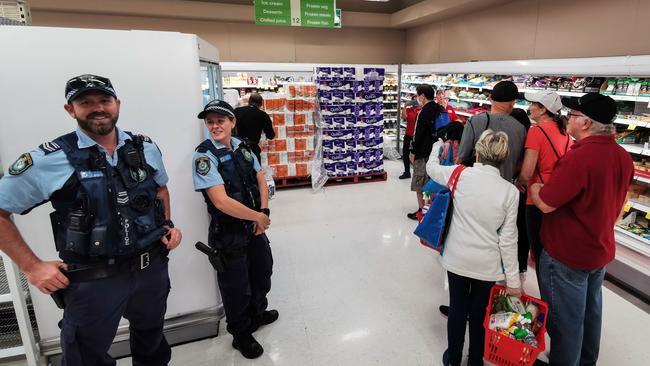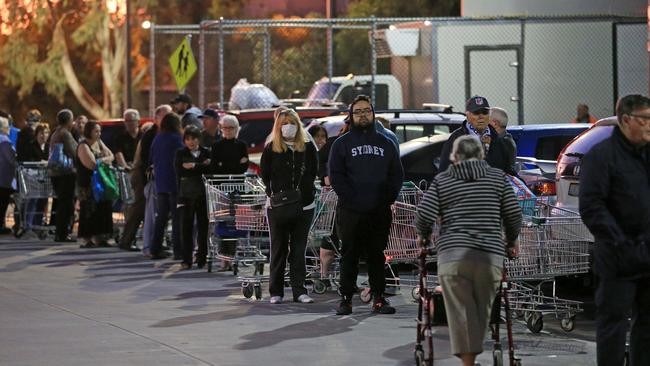Coronavirus: For once, the government was better than its people

Likewise, if we are mere members of a tribe defined by our sexuality, our racial identity or our gender — merely one incorrect pronoun away from suicide — rather than citizens bound by an allegiance to our state and homeland, then why expect courage and self-abnegation in the face of peril. Victims run in the face of danger. Those who insist “words can kill” are unlikely to respond to calls for resilience in the face of peril.
When I finally deactivated my Twitter account under a deluge of C-bombs from people who modestly included that other magic C-word — compassion — in their profiles, I had already despaired of our ability to engage in a sane way outside our social media tribes. I sense our social cohesion has been fragmented rather than enhanced by technology. Other episodes confirmed this. I posted a photo of me with Alan Jones and Peta Credlin on Facebook. As I have written once before in this newspaper, in my darkest hours Alan Jones was a stalwart and caring friend. I do not lightly say I owe my life to him and a god to whom I pray and whom I found at the bottom of an empty schooner glass about 30 years ago. Neither Jones nor God are fashionable friends on Twitter and Facebook.
The intensity and tenor of the abuse that accompanied my posting of that photograph told me all I needed to know about the era through which we are passing. Authenticity has been usurped by empty “likes” by ephemeral friends whom one has never met, yet who reserve the right to police one’s real friendships and political views. That lovely transsexual who talked about cricket cannot possibly believe in God and vote for the National Party. Surely not? Sorry. That is a yes and another yes. So, I finally walked away with a mixture of disgust and relief from both platforms. Yet I was grateful for the hundreds of virtual friends whose extravagant, scolding abuse told me who they really were and revealed that, like most ideologues, they prefer abstractions to people. They prefer hectoring into the ether to debate. And their decency is but a thin veneer. This, more than plague and pestilence, is the greatest threat to our survival as a decent democratic polity.
I have largely adhered to my abstinence from social media but dropped social distancing to confirm my biases when Peter Dutton was diagnosed with COVID-19. Thousands either expressed the hope that he would die, or approved of those who expressed that noble, conspicuously compassionate sentiment.
— Peter Dutton (@PeterDutton_MP) March 13, 2020
The torrent of abuse was sickening. The irony of gloating at a father of three being infected with a potentially fatal disease, while piously advising others to “care for each other more peeps”, was apparently lost upon many of them. But tribalism has replaced citizenship.
And civility, according to one academic, merely reinforces privilege. Thanks for that cerebral insight, comrade. So, calling singer Sam Smith “him” is no longer a hate crime? If words kill, whom do they kill? Only the queer? Will civility be restored during the post-revolutionary phase, comrade? May we again treat others as human beings with civility after privilege is abolished and we all spend our time and universal socially provided income at festivals of dangerous ideas and writers festivals?
I’m feeling much better this morning - thank you to everyone for your well wishes.
— Peter Dutton (@PeterDutton_MP) March 14, 2020
Full interview: https://t.co/6zfvXb8Q8m pic.twitter.com/B5b6asM8dV
The poor are made of sterner stuff and are underrepresented on Twitter. And to the frustration of the left, especially in the academy, they have displayed a dispiriting lack of revolutionary zeal. Their false consciousness is manifest in multiple ways. They still believe in the nation rather than the United Nations. Some stubbornly cling to a belief in religion. And in numbers that continue to confound Labor and the Greens, they have returned centre-right Coalition governments for most of the period since World War II.
The humiliation of the political class last May makes me wary of rushing to judgment. Predictions are fraught with risk. Who saw this virus coming? But a few trends have reached an apotheosis and I warily offer some thoughts on where we may be heading. As the redoubtable Churchill said in his nation’s darkest hour, “I have myself, full confidence, that if all do their duty and nothing is neglected, and the best arrangements are made — as they are being made — we shall prove ourselves once more able to defend our island home”. We will come through this. But what sort of nation will it be at that time, when it arrives?
Those words resonate today, spoken as they were by a man who had fought in wars and been under fire and survived. Both he and much of the generation to whom he spoke had already endured the Great War, the Great Depression and were awaiting the bombing of their cities. No doubt they could have used a good belly laugh from one of the ABC’s stable of rib-tickling and profane comedians.
But they had to be content with Churchill and their naive belief in their nation and their social fabric sustained by faith in their nation, faith in God and the knowledge that they had been repelling invaders since 1066. Churchill also observed, “when great forces are on the move in the world, we learn that we are spirits not animals”. Now is such a time.
This week Scott Morrison spoke with authenticity about the perils that lie ahead. He did not rise to the heights of Churchill. That is perfectly fine and understandable. We do not face the existential threat that Britain faced in 1940. But he spoke from his heart and it showed. The Prime Minister declared hoarding and selfishness un-Australian. I wish I could share his certainty about that. People get the government they deserve, so the saying goes. This week that cliche was inverted. The government deserved better from our people. I saw less spirit than animal herd behaviour.
Pervasive commodification and secularisation have undermined our sense of community. Permanently? I hope not. When I read Trent Dalton’s beautiful series in this newspaper about the residents of one suburban street in Brisbane I was inspired. Just one street. Six random people brought together by fate, geography and shared decency. Merely weeks later, I hope that the Prime Minister is not overestimating our nation. Are there more Sunny Avenues than riotous, panicked supermarkets? Are we spirits or animals?

But when victimhood is valourised and every individual indulgence is clothed in the language of inalienable rights, then we have moved a long way from the foundations of this nation and those of broader Western civilisation. The riots over toilet paper were revelatory. We may look back on them with a mixture of mirth and embarrassment in several months.
But I fear they revealed our underlying fragility and the narcissism of an age where the transcendental and the communal are ridiculed and reviled. The persecution of Israel Folau was an ominous portent of how far this nation had strayed from its founding creed. A man was socially ostracised for quoting from the very book used to administer oaths in our courts and legislatures. Why not ban the book if it so causes offence? Yet Folau was erased by the same people who proclaim, “we will not be erased”, as if an imminent genocide awaited them in this, one of the safest nations on Earth.
There is little explicit recognition of faith or religion in our Constitution because it was a given. Simply assumed and pervasive in their moral terrain. Those who believed that death was not the end of our story knew fear, famine pestilence and war better than we do. But they prevailed in war and Depression. Chalk up wins for the West over secular totalitarianism. The current terror is symptomatic of a people to whom any inconvenience — much less suffering — is an anathema because it is meaningless. Again, Shakespeare said it best: “Cowards die many times before their deaths.”
My faith tells me that in the spiritual economy nothing is wasted. There are seasons in our life. A time to reap and a time to sow. A time to live and a time to die. The ancients understood this even before the time of Christ. As Aeschylus wrote: “He who learns must suffer. Suffer unto truth. But then ripeness comes as well. And even in our sleep, pain which knows no forgetting falls drop by drop upon our heart. Until — in our despair, against our will — comes wisdom to us through the awful Grace of God.” The panic of the past few weeks reveals a society in which God is dead. But the corollary of that hollow progressive victory is pervasive communal terror of death and a loss of stoicism in the face of death or mild deprivation.
Anzac commemorations have been cancelled. That is sad. But maybe we are now a nation so lacking in courage that it may be an honest admission of our unworthiness to celebrate the Anzac legacy. For my part I intend, God willing, to join some of the gunners from the gun line on that brutal afternoon at Long Tan in August 1966 at a small town in Victoria. We may even shake hands and hug one another. Along with reading prayers these are revolutionary acts in these arid times. To paraphrase Shakespeare: “For he that outlives this day shall be my brother. Be he ne’er so vile this day shall gentle his condition. And those abed (in social isolation) shall feel themselves accursed they were not here …” One of my mates summed it up less eloquently yet more succinctly than any of the social media poseurs this week: “I worked out why everyone is hoarding bog rolls. Because every time someone sneezes the rest of us shit ourselves.” Maybe we have lost more than the Holden in this season.
Catherine McGregor is a freelance writer. She is a graduate of the Royal Military College who served in the Australian Defence Force for more than three decades including three operational deployments overseas.



“When sorrows come, they come not single spies but in battalions.” So wrote the Bard in Hamlet. After a long drought, bushfires and now a pandemic, that ancient wisdom says it better than most of the cute virtue-signalling and blame-shifting on Twitter. These are challenging times. Times that will reveal who we really are and what we truly believe. So far, the signs are neither inspiring nor encouraging. My sense is that we are reaping what we have sown since the end of the Cold War. Radical individualism whether in the form of laissez faire economics or racial and sexual identity politics have reconfigured what it means to be a citizen in a robust democracy. Neither the left nor the right are entirely free of blame. The great toilet paper riots of recent weeks were the apotheosis of two trends. First, if people are consumers constituting a market rather than a nation then hoarding and demanding immediate satisfaction are both rational and inevitable.